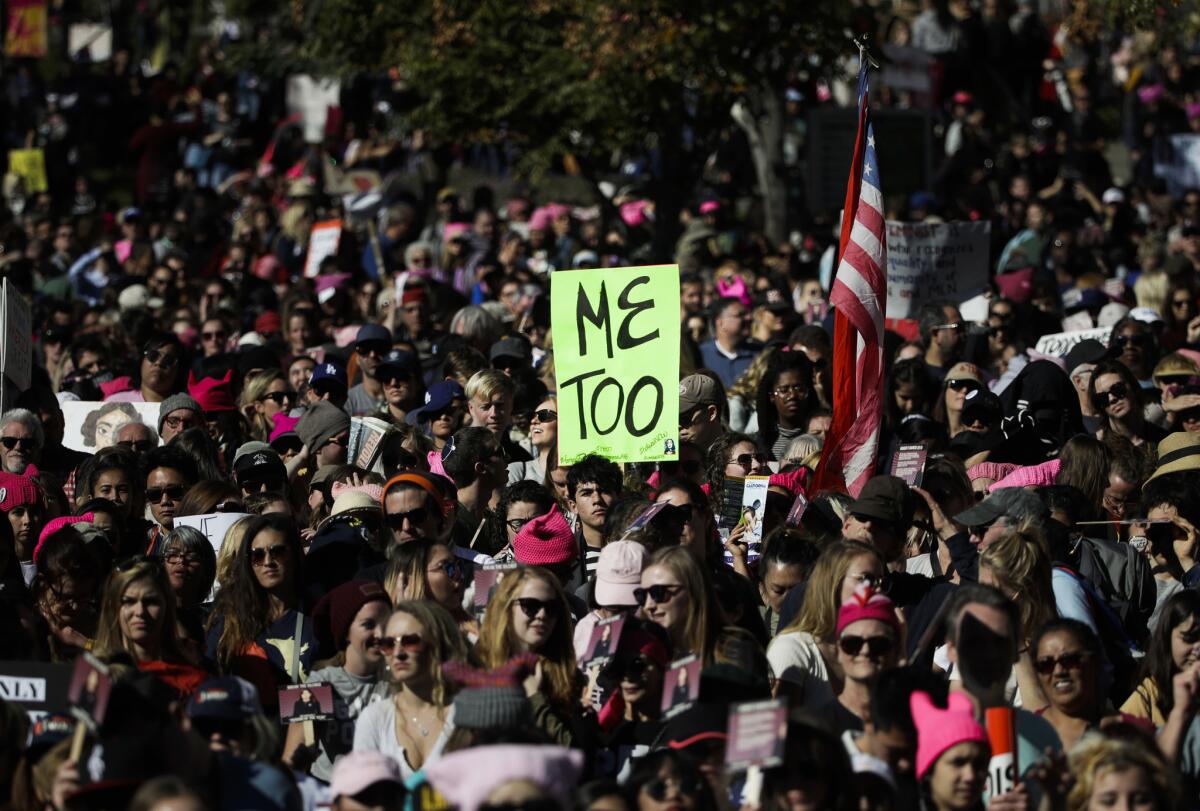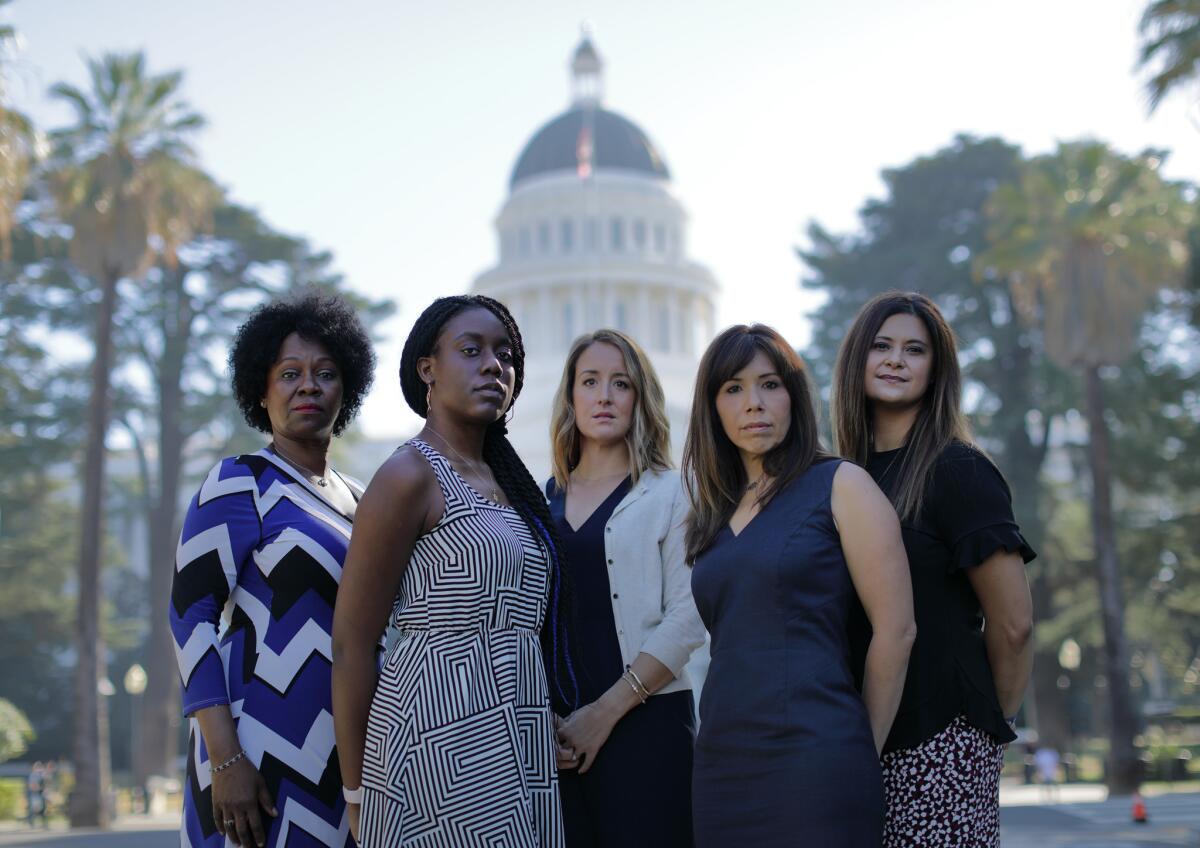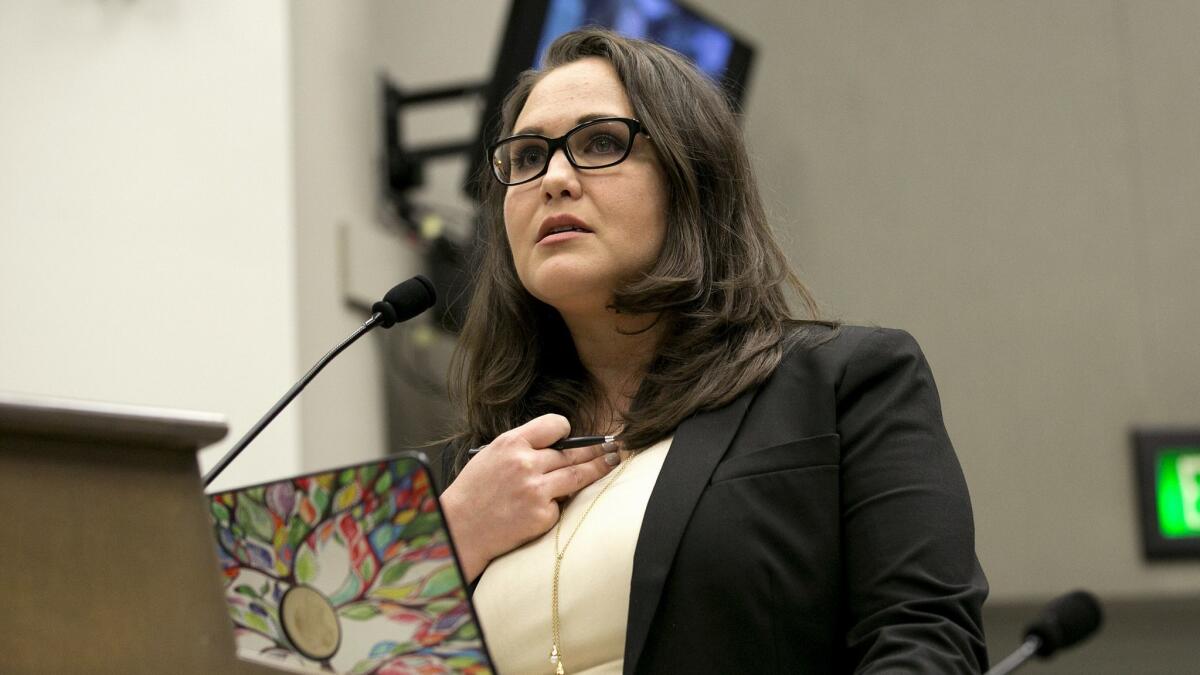An open letter brought the #MeToo movement to California politics. Here’s how the women behind it feel one year later

Reporting from Sacramento — Adama Iwu knew the letter she and more than 140 other women signed last fall would break Sacramento’s unspoken code of silence, outing a California political culture rife with sexual misconduct.
But she didn’t expect it to trigger a salvo of allegations and ultimately the resignations of powerful people.
“My intent was to basically have this be a shot across the bow and I thought some people would chill out with their behavior,” the lobbyist said. “So much more has happened.”
On the one-year anniversary of the letter, The Times surveyed women who signed it, asking them to look back on the past year and ahead to the future. Of the 62 women who participated in the survey, a majority said they believed the letter had a positive effect on California politics and felt optimistic for the future of the #MeToo movement.
That doesn’t mean it has been easy. Some found themselves in the spotlight. Others said they were “slut shamed” and criticized. One was fired and filed a lawsuit against her employer. Another was sued by a lawmaker for defamation. They lost friends and sleep.
The letter they penned last October using the tagline “We Said Enough” stirred a tangle of emotions — pride, empowerment, unease — that speaks to the complexity of this cultural moment. And knowing what they know now, all but three of the women said they would sign it again.
The Times gave respondents the option of answering the survey anonymously. About half allowed their names to be published, indicating how sensitive the topic is a year later.
Several women surveyed said increased accountability for elected officials accused of misconduct was the most important outcome of the #MeToo movement over last year.
Assemblymen Matt Dababneh (D-Woodland Hills) and Raul Bocanegra (D-Pacoima) were accused of sexual harassment and assault and resigned late last year. State Sen. Tony Mendoza (D-Artesia) gave up his seat in February after several women accused him of sexual harassment. Assembly and Senate investigations substantiated complaints against all three legislators. Allegations against Bocanegra and Mendoza were reported to the Legislature years ago, but never publicly disclosed before this year.
An early face of the movement, Assemblywoman Cristina Garcia (D-Bell Gardens), is under investigation for allegations of groping a Capitol employee. Legislative investigators are also looking into allegations that Garcia and Assemblywoman Sharon Quirk-Silva (D-Fullerton) retaliated against the man for speaking out.
Each of the legislators responded to the allegations with denials of wrongdoing.
Three other male legislators were internally sanctioned for various violations of the Senate and Assembly codes of conduct — hugging, noogies and making threats to “bitch slap” women — over the last year.
“It was eye-opening for me as the stories came out to see how many women I knew personally had been victim to harassment and assault from legislators,” said Rebecca Griffin, a communications specialist.
Pressure mounted on Democratic leaders to adopt new laws and policies to protect their employees. Both houses adopted a joint policy to hire law firms to investigate reports and publicly release substantiated findings. Gov. Jerry Brown signed laws that ban retaliation against legislative employees and outlaw a common legal practice at the statehouse that allowed lawmakers to reach secret settlements with people they sexually harassed.
Coverage of California politics »
Other women highlighted a less measurable effect: the beginnings of cultural change in the Capitol. As one woman put it, the “lid is off the box.”
“I believe the most important outcome of the movement in California politics, like the movement in every aspect of our culture, is the shift from one’s personal and private story to many, many collective stories and the uncovering of what a prevalent problem sexual harassment and intimidation is in our industry,” said Jodi Hicks, a lobbyist.
Jennifer Wada, a political consultant, said the letter “raised the consciousness of the entire political community, which was long overdue.”
“In this business, the culture can degrade quickly if not monitored and checked by strong voices,” Wada said.
But others said that abuses of power still continue. One woman, who wished to remain anonymous, said it seemed that many men don’t want to admit their behavior is a problem.
Cynthia Bryant, executive director of the California Republican Party, questioned the movement altogether.
“I struggle daily with whether or not it makes the environment different, and if it is different, is it better,” she said. “Certainly, the most egregious incidents have no place in our world, but have we eliminated through overreach some kind of civility that we will long for someday?”
A few women who responded to The Times’ survey described dramatic repercussions for speaking out, while nearly one third of the women who answered said nothing changed in their day-to-day lives as a result of the letter.
“Sadly, the letter and the action around it seemed to have vanished from memory in the broader context of the political environment,” wrote Natalie LeBlanc, a political consultant.
One woman said silence from her loved ones spoke to the delicacy of the issue.
“I was really surprised my husband and my mother never asked what happened to me after knowing I signed the letter,” said the woman, who asked to remain anonymous.
Many who responded said it inspired meaningful discussions about sexual harassment with friends, coworkers and family.
“It is no longer something I have to internalize or compartmentalize,” said Danielle Kando-Kaiser, a lobbyist.
Another woman, who declined to be named, said her employer retaliated against her for signing the letter.
“The leader of my unit, a woman, told me I’ve jeopardized everything for our organization’s interests in Sacramento,” she said. “I was also disappointed by lobbyists and leaders in Sacramento that told me I’d made a mistake. It was a very trying time.”
“I hope I’m brave enough to tell my story at some point,” she added.

Tina McKinnor, a campaign strategist, said some men in the political community stopped speaking to her for a time after the letter was published.
The Times surveyed the women during the confirmation hearings for now-Supreme Court Justice Brett Kavanaugh. The conversation about sexual assault playing out on the national stage weighed heavy on the respondents’ minds.
McKinnor said watching the hearings “felt like I got punched in the stomach.”
Despite their best efforts, men just don’t understand, said another woman who asked to remain anonymous.
“And for a generation, we will have five men on the highest court of the land continually decide against our most personal healthcare decisions,” she wrote. “So today of all days, I am just really disillusioned with it all.”
Some of the signers said they hope their actions will create a better environment for the next generation of women in California politics.
Connie Sanders Emerson, a political fundraiser, said the letter allowed her to speak her truth.
“I have a 19-year old daughter now interning in the office of a state senator,” she said. “I am optimistic her experiences will be far more positive, more respectful, safer than what others have experienced.”
Times staff writer Mini Racker contributed to this report.
Adama Iwu, vice president of state and community relations, Visa Inc.
Samantha Corbin, partner, Corbin and Kaiser
Alicia Lewis, founder, Lewis Public Affairs
For better or worse, Adama Iwu became an international spokeswoman for the #MeToo movement.
She said a man sexually harassed her at a work event last year and her frustration over the experience gave birth to the letter. Seven weeks after its release, Time magazine included Iwu on its “Person of the Year” cover along with several other prominent women in the #MeToo movement, who the magazine dubbed “The Silence Breakers.”
Iwu logged onto Facebook the day the cover published and learned her college alma mater posted the edition.
She called Samantha Corbin, a lobbyist and close friend, to tell her.
“Sam was like, ‘You’re an idiot, everyone is posting it,”’ Iwu recalled. “’Everyone who has ever met you once is posting it.’”
“One of the things that I’ve learned this year is, it’s all good to talk about change and wanting change and how everyone needs to push for change, but apparently sometimes someone has to do that,” Iwu said. “I wish it hadn’t been me, honestly. But I don’t regret doing it.”
Iwu said she sometimes feels uncomfortable with the expectation that she’s an expert who has all the answers about addressing sexual harassment. There are days that she doesn’t want to talk to reporters. She deleted her Facebook account earlier this year after receiving hateful messages.
“This is way bigger than me,” said Iwu, who has addressed crowds of women all over the country. “That’s what I have to keep reminding myself.”
After going public with the letter, Iwu, Corbin and their friend Alicia Lewis launched a website and asked people to anonymously share their stories. They also started a nonprofit to push for policy changes and develop technology for real-time reporting of harassment and assault allegations.
Website hits swelled to the thousands in the first few days, Corbin said. She listed her cellphone number as a contact for the group. Dozens of women called and unloaded difficult stories from their past.
“I couldn’t get off the phone fast enough to field the next call,” Corbin said. “I would wake up to 20 or 30 or 40 emails really from women describing what was the worst day of the lives.”
Corbin said the stories left her feeling vindicated — that she and her friends weren’t alone, crazy or making something out of nothing. But becoming “a trauma sponge for hundreds upon hundreds of women” took a toll and brought back painful memories of an assault years ago.
At the suggestion of her boyfriend, she met with a crisis counselor.
“So long as we’re still engaged in these conversations and in this work, it can be constantly triggering or re-triggering,” Corbin said. “Every time you pick at the scab you cause a little more damage.”
Lewis assumed the list of seasoned Republican and Democratic political operators who signed the letter would force the Capitol community to consider their concerns as credible and lead to a collective “aha” moment.
Instead, “people were pissed” about the letter, she said.
“I really lost sight of the fact that misogyny seems to know no bounds and would come with a force toward women stepping out of line, even powerful women,” Lewis said. “[Some of the women who signed the letter] walk into a legislative issue or political issue and people step out of the way because they know a heavy hitter, a big-time person, is right there. I thought that was going to be enough.”
Lewis sued her employer, Wilke Fleury, for wrongful termination in January. She alleged in the lawsuit that the Sacramento law firm fired her after she signed the letter and reported to human resources that she experienced sexual harassment.
Lewis was unemployed for months. Wilke Fleury eventually settled the suit, according to Lewis’ lawyer.
“While sometimes it was painful and sometimes it was overwhelming, I can honestly say to my children that I stuck up for myself, I spoke my own truth,” Lewis said. “That carries way more weight than anything from any colleague, coworker or anyone I interact with professionally.”
— Taryn Luna
Pamela Lopez, partner, K Street Consulting
Since Pamela Lopez signed her name to the letter, the #MeToo movement has been on her mind every day.
Sometimes there are good days, when she has felt energized by the network of women who have offered each other support and solidarity.
Other days, she said, “it’s just exhausting. It’s exhausting to see how much badness there is, and how deeply so many women — really all of us at some point of our lives — are exploited or sexually harassed or sexually assaulted.”

Soon after the letter was published, Lopez came forward to allege that a lawmaker masturbated in front of her. Lopez initially declined to identify the legislator, setting off weeks of speculation. She had to justify to allies why she wasn’t inclined to name names.
“I had to keep explaining to them: Listen, this is important. I don’t want us to write off one person as a bad apple,” she said. “This is an example of a pervasive problem.”
But Lopez said the rumor mill became a distraction. Within two months, she identified the legislator as Matt Dababneh, a Democratic assemblyman from Woodland Hills, and said he exposed himself to her in a hotel suite bathroom during a Las Vegas party. Dababneh denied the accusation and resigned less than a week later, saying the allegation made it impossible for him to do his job.
A legislative investigation into her complaint substantiated her claim and rejected Dababneh’s request for an appeal. He is now suing her for defamation, saying her public accusation was false and damaging to his career and reputation in the community.
Now Lopez is forming a nonprofit group to support women who have been harassed, including those outside the Capitol such as restaurant workers in the Bay Area.
Lopez has no regrets about sharing her story, but if she could go back in time, she said she would not sign the letter. She soured on the We Said Enough founders, who she said appointed themselves the decision-makers for the movement. She said she was frustrated when they discouraged her to speak publicly about her experiences.
“I was not allowed to tell my own narrative,” she said.
Group leaders said they urged caution about the risks of speaking publicly. Adama Iwu, a founder of the group, said she and her colleagues have “always said every woman has the right to tell their truth, tell their story.”
“It makes me incredibly sad to hear this. This is the first I’ve heard of a falling out,” Iwu said. “Frankly, I’m sure she’s under an unimaginable amount of pressure right now with the defamation lawsuit she’s facing.”
Still, Lopez said the #MeToo movement allowed her to fight for a greater good.
“I will make less money because I’m distracted doing this work all the time. I’m focused less on everything else,” she said. “In some ways, you could say this came at great personal cost to me, and I guess it has. But this is the important stuff.”
— Melanie Mason
Kassy Perry, president of Perry Communications
After 25 years in the state Capitol, public relations executive Kassy Perry says she’s used to fighting against the “old boys club.”
Perry describes the letter as a “galvanizing symbol” of a desire to change the culture in the Capitol.
But now she worries the #MeToo movement could make it harder for women to get a seat at the table.
“Men feel safer with no women in their group at a bar, at an offsite event or on a golf course,” Perry said. “Unfortunately, that’s where you get to know someone and that’s how the business occurs. That doesn’t happen just picking up the phone.”
She began her career in journalism and said decades ago a manager at a radio station attempted to leverage his power over her.
“I was pushed up against a wall and kissed and told if I didn’t do certain things, I wouldn’t be there very long,” Perry said. She quit.
Perry said she wanted the letter to force a discussion and lead to an agreement between men and women that sexual harassment and assault in the workplace must end. But she says it may have gone too far.
“Watching men dropping like flies from jobs right after Harvey Weinstein, I kept thinking, ‘I really hope we’re not the jury and convicting without evidence,’” Perry said.
She also worries assault and harassment stories may become a political tool after the confirmation of Supreme Court Justice Brett Kavanaugh. Perry doesn’t believe men should be taken down “for things they did 50 years ago.”
“I support the movement, but in every movement, you need to have caution in how it’s used and by whom,” she said.
— T. L.
Anette Smith-Dohring, workforce development manager, Sutter Health
Anette Smith-Dohring was the girl with the large breasts, and men of all ages never let her forget it.
From the time she hit puberty through adulthood, they have ogled her, hit on her, made inappropriate comments, touched her and treated her like she was stupid, she said. The attention changed how she felt about herself and she built up an emotional wall.
Over the last year, she finally started to take it down.
When the movement increased awareness about sexual harassment and allowed people to discuss the problem in casual conversations among friends, coworkers and family, Smith-Dohring said she took those opportunities to begin talking about her experience for the first time.
“When I would say, ‘That happened to me too, I’ve been harassed over the last 20-something years in my career,’ everyone was surprised, and then they started telling their stories,” Smith-Dohring said. “It may have been something small, or it may have been kind of violent.”
Smith-Dohring said the reactions to her appearance changed her personally and professionally. She dressed more conservatively and underwent breast reduction surgery.
“When the old boys network were making deals over dinner or on the golf course, I wouldn’t put myself in those positions,” Smith-Dohring said.
She sometimes wonders about the opportunities she missed as a result.
“How would it have changed my career trajectory if I had put myself in those situations?” she said.
— T. L.
Kelly Boyd, partner, BBC Public Affairs
Kelly Boyd was working at a state agency more than 30 years ago when a superior called her into his office to discuss a report she wrote that was praised by her coworkers.
He closed the door and drew the blinds, she said. Then he compared the report to pornography that left him feeling unsatisfied.
“He asked if I thought I had what it takes to keep him satisfied,” Boyd said. “I was devastated.”
Boyd confided in a female supervisor who told her to stay away from the manager, so she did. She wouldn’t offer that same advice to women in similar situations now, she said. She’d call out men who harass.
“That’s what changes the environment — when we’re all accountable and we’re invested,” Boyd said.
Although Boyd sees positive steps forward as a result of the letter, she said her “greatest disappointment” is in men who refuse to evolve and recognize the impact they have on younger generations.
“I guess I feel maybe lately that we aren’t having the same conversation,” Boyd said. “A lot of women are having one conversation and some men are having a different conversation, where they really do feel victimized.”
“If you’ve never done anything to harm to anybody, then you don’t have to be afraid,” she said.
— T. L.
Follow @tarynluna and @melmason on Twitter for the latest on California politics.
More to Read
Get the L.A. Times Politics newsletter
Deeply reported insights into legislation, politics and policy from Sacramento, Washington and beyond. In your inbox three times per week.
You may occasionally receive promotional content from the Los Angeles Times.











